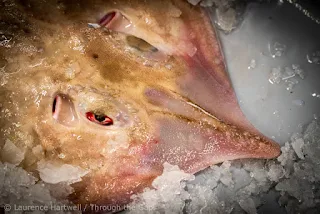back in Newlyn many of the boats are still at sea despite the continuing rising coast of fuel which has already impacted on the fleet and forced some bigger vessels to lay up......
despite higher than average prices for quality fish like Dover sole......
megrim...
monk...
red mullet...
and turbot...
and the handliners are enjoying some summer bass...
and plenty of mackerel in the bay...
which will have put a smile on Cap'n Cod's face no doubt...
paws a-plenty...
and bait for the crabbers...
along with the odd box of big ling...
good to see Joe back at the helm again...
with the price of mackerel sky-high this guy may be waiting for his breakfast a while yet...
Girl Pamela heads out through the gaps...
as the Lyonesse Lady heads in...
sleek wind farm vessel MMS Crusader...
another classic sailing boat headed for some fun in Mousehole later today...
work continues on the quays in Newlyn replacing worn fenders...
the Nazarene takes advantage of a quiet berth on the beach in the Old harbour, a safe haven for boats since at least the 12th century...
another classic boat waiting for the tide to enter Mousehole...
for Sea,Salt's & Sail...
a festival very much about the community and the working boats that used to fill the harbour - good to see the lugger, Guide Me, built in 1911 and still without an engine - she has seen a family raised aboard her and sailed across the Atlantic before now, Cornish history in the flesh...
"Once upon a time you could look down on the channel between St. Clement's Island and Mousehole Harbour and see one of the largest Cornish fleets of luggers, heading out to their fishing grounds. Sea Salts and Sail will re-enact that scene as over forty traditional boats with similar tanned sails, leave the port, tacking back and forth inside and around the island. This festival really reveals Mousehole's close relationship with the sea. From kids paddling at low tide, sculling races, to the harbour packed full of historic vessels, it’s when the village really comes to life. It will be a very nostalgic scene whether you are a spectator on the shore or a participant under sail - be there! The best way to arrive is by classic boat, of course - I'll be on the 40' lugger Barnabas."
Toby Floyer - Skipper of lugger Barnabas, 1881 St Ives mackerel driver (Cornish Maritime Trust)
Crusader bound away.



































































